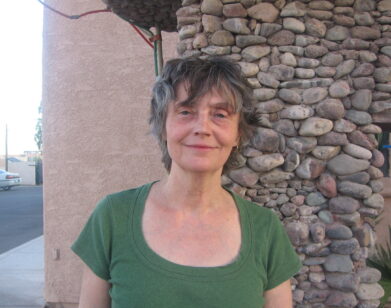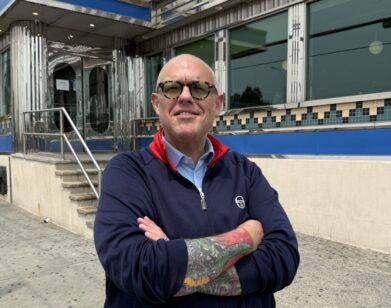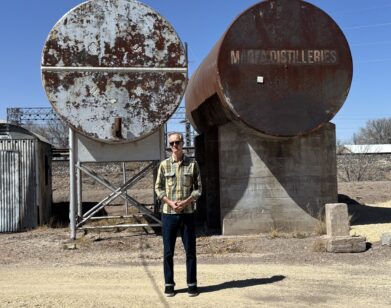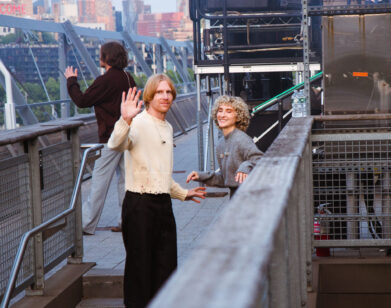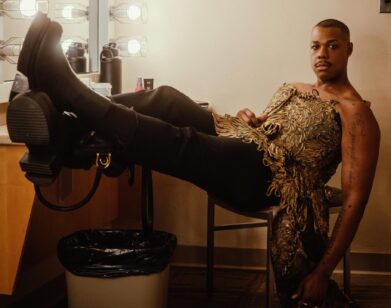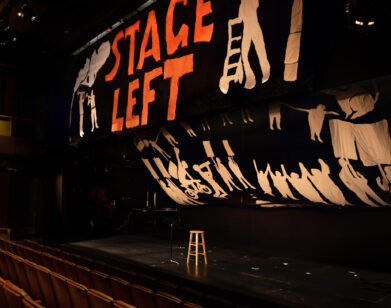The Kid with a Bike: Gabriel Ebert
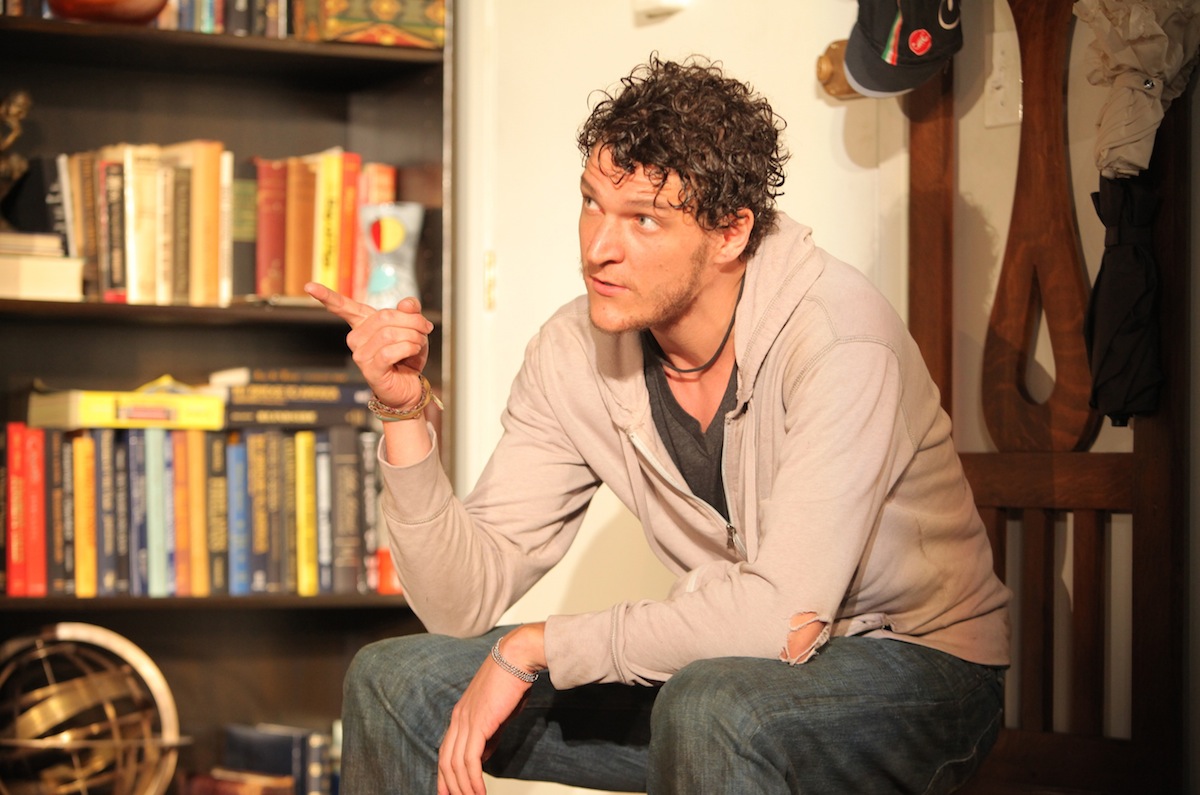
ABOVE: GABRIEL EBERT IN 4000 MILES. PHOTO COURTESY OF ERIN BAIANO.
As Leo in the play 4000 Miles, Gabriel Ebert shows up at his grandmother’s apartment at three in the morning, dirty and defensive, an emotional pit—and grips his audience completely. Crashing with his 91-year-old grandmother (played by the exceptional Mary Louise Wilson) at her West Village home, Leo attempts to work through the loss of his best friend in a cross-country biking accident. He struggles to heal and allow his softer side to fully emerge, but the audience sees clearly how dominant his optimism once was. The entire cast of 4000 Miles is resuming their roles after the success of a short run last summer; by now, Wilson and Ebert are perfectly attuned to one another, unfolding the play’s sorrow and humor with genius interplay. Interview spoke with Gabriel Ebert about the powerful role, riding bikes, and why intense characters are his thing.
MERYL CATES: This was the second run of 4000 Miles for you—it premiered last summer. Did you have any inclination it was going to be so well received when you began?
GABRIEL EBERT: I didn’t really. I felt a little bit strange because it was set up to do just a two-week run down at the Duke and I thought, this is a really good play, it’s a shame it will only have a two-week run. I was up there with Mary Louise Wilson, who is a force to be reckoned with—so are the other two girls in the play, as well. But little did I know that we’d be actually doing it for months and months.
CATES: Right, so the whole cast has returned. You must feel like you inhabit these characters at this point?
EBERT: Yeah, it’s a cool opportunity. I’ve never gotten to revisit something before, so it’s an exciting thing to be able to come back to it with fresh eyes or, I don’t know if I have any objectivity about it, but it sat into a deeper part of us somehow and when we came back to it this spring it was just a little bit different, a little bit deeper maybe.
CATES: True, how was it coming back to the role? It has been almost a year; did you experiment with the role again or have any perspective changes?
EBERT: Yeah, well there were a few things that maybe happened. We had two weeks of rehearsals to put it back up on stage, to explore the new space. The stage is a little bit different. The first time we did it, it was in a proscenium and this time it’s in a thrust, and that’s a bit of a different thing. And the apartment is a little bigger. Maybe in rehearsal there were a couple of times I thought, “How did I not realize that last time? How did I miss this moment?” But I tried to, actually, not touch it because it’s so well written that if I stay out of the way of it as much as I can, the truth comes through more.
CATES: And you said the set was different, and the staging. This time around the audience is right there because of the thrust stage. It seems like such an important part of the play, that it was staged this way—but what are your thoughts because you’ve done it both ways?
EBERT: Well, first it was a little frightening, because the proscenium just sort of cut the stage off right at that table. We spent a lot of time on the couch, as you do in a play that’s in an apartment, and there wasn’t any stage in front of the couch, but now there’s this whole huge playing space out there. So at first it was a little terrifying, it’s like jumping into the ocean. It actually allowed us to play a lot more and, in a way, we sort of restaged the whole play. We didn’t throw away everything that we had done the first time, but we definitely took the things we had done the first time and built on them.
CATES: The way 4000 Miles is written, the backstories are extremely complete without it bombarding you with past details. How did you get into your character?
EBERT: Some of it’s sort of closer to home than a lot of characters I’ve played. I’m from the mountains, I grew up in Colorado. They call me the mountain man. A lot of it’s me up there. Half of the clothes are mine; I like to wear plaid and jeans, and this is my hair and my beard, so in a way it’s close to home. But I’ve also lost someone who is very close to me. So there are ways in which I connect to Leo’s journey, struggling with loss, taking responsibility for himself. I had to learn a bit about the communism aspect of it, because that was never a part of my childhood. But the loss and connection to older generations is something that I really find important and I feel really lucky to be doing on the stage. So there are ways in which it came easily to me and then there are ways in which I had to work. You know, I grew up on a dirt road too, so I was never really good at riding bikes.
CATES: [laughs] I was going to ask if you bike at all.
EBERT: Yeah, I definitely didn’t ride across the county. Amy [Herzog], the woman who wrote it, she has made the trip. She has made the cross-country trip actually on the bike that I have in the show, which is very cool. So the bike that I’m carrying has been across the country and perhaps somewhere on that seat the idea was hatched for the play. But, yeah, I did a lot of biking up the riverside to get ready for it.
CATES: Maybe the thoughts of the play did come to her on that bike—that’s very poetic of you.
EBERT: Yeah absolutely. I can feel the history when I carry that thing in. [laughs]
CATES: You’ve done new plays and originated roles. Do you, personally, approach the role differently than one that has been done before, like Suicide, Incorporated? Is your process different whether you’re the first or the 10th?
EBERT: No, I don’t think so. I like to just go at it. I guess I probably approach it as though I’m the first person playing it every time I do it. Even if I’m doing, you know, Romeo or something, I’ll just go after it as though no one’s ever done it before. I think I always approach a play, hopefully, with an open mind and an open heart, and then I can find my own relatability to it.
CATES: What do you look for in a play or a role?
EBERT: I love reading plays, and I guess I try to look for something in the play that I can believe in. And then in the role, I don’t know, that’s a great question, what do I look for in a role? I wish I could just rattle one off for you, but man I don’t really know—it’s probably different every time. Like I said, Romeo, but truth be told I’d probably want to play Mercutio. I can’t really tell you why, he’s more sort of like, “Fuck it all.” He’s more dangerous and also imperfect. He has flaws, you know? I like flaws in a character. I like coming into a character and not judging them, thinking there’s something very human about them that I hope is not in my genetic personality, but I really want to bring that out because I think it’s dark and then I can have the light as well.
CATES: Tell me about your experience working with Mary Louise Wilson. You have this comfortable relationship on stage; bring me behind the scenes a little bit.
EBERT: All right, well, we did one reading of the play together maybe two years ago or something, and I think that reading was maybe what spawned the idea of doing a production. We just sort of clicked right away. At the reading we didn’t talk much, I had just seen her on an episode of this show called Louie, and she plays Louis C.K.’s mom and she’s fucking hilarious. So I was like, “Oh hey, I’ve seen you in this show,” and so we talked about that. But then once we got into production she really wanted to make sure all of the girls were in the same dressing room. Luckily we’re in a very small theater, so that was just the case anyway, but the four of us really hang out. I’ve gotten to go to her house upstate and help weed her garden with her, and cook some meals, and hang out. She’s become a great, important person in my life. To be on stage with her is a master class every night in listening and presence and truth. It’s just a wonder to be up there with her and I feel very supported by her, but I also feel like there is a way in which I can support her, it’s very reciprocal. I’m very grateful for that.
4000 MILES IS CURRENTLY PLAYING AT THE MITZI E. NEWHOUSE THEATER IN LINCOLN CENTER. FOR TICKETS, CLICK HERE.

